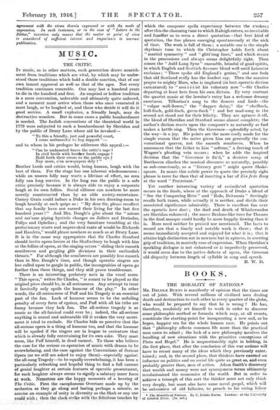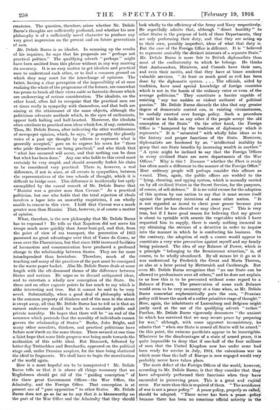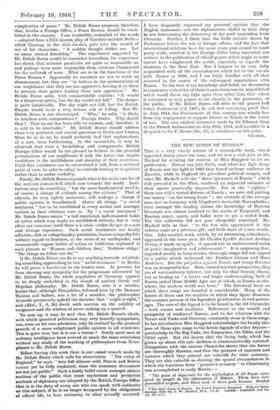BOOKS.
THE MORALITY OF NATIONS.*
Mn. DELISLE Belem is manifestly of opinion that the times are out of joint. With several millions of civilized men dealing death and destruction to each other in every quarter of the globe, who would be prepared to say that he is wrong ? He has, therefore, resolutely set himself to work in order to discover some philosophic method or formula which may, at all events, constitute the starting-point for inaugurating a new and, as he hopes, happier era for the whole human race. Ho point., out that " philosophy affects common life more than the practical man cares to admit ; the lack of a new philosophy involves the handling of new situations with the primitive conceptions of Plato and Hegel." He is unquestionably right in holding, in the first place, that after the conclusion of this war nations will have to recast many of the ideas which they previously enter. tained ; and, in the second place, that thinkers have exerted an influence on politics and on social life quite as great as, and even probably greater than, men of action. Adam Smith's discovery that wealth and money were not synonymous terms ultimately revolutionized the economics of the world. But in order to achieve a triumph of this sort the thinker must not only think very deeply, but must also have some novel gospel, which will be subversive of old fallacies, to preach to his erring fellow • The Morality al Nations. By C. Dellade Burns. London : at the Unlvcrs!ty of London Press. Ps. net.j
creatures. The question, therefore, arises whether Mr. Belisle Burns's thoughts are sufficiently profound, and whether his new philosophy is of a sufficiently novel character to produce any very great impression on the present and on future generations of men.
salr. Delisle Burns is an idealist. In summing up the results of his inquiries, he says that his proposals are " perhaps not practical politics." The qualifying adverb " perhaps " might have been omitted from this phrase without in any way marring its accuracy. It is no easy matter to get idealists and practical men to understand each other, or to find a common ground on which they may meet for the interchange of opinions. The latter, having a clear perception of the impossibility of at once realizing the whole of the programme of the former, are somewhat too prone to brush all their views aside as fantastic dreams which are undeserving of serious consideration. The idealists, on the other hand, often fail to recognize that the practical men are at times really in sympathy with themselves, and that both are aiming at the attainment of the same objects, although the politicians advocate methods which, in the eyes of enthusiasts, appear both halting and half-hearted. Moreover, the idealists often attribute to practical men ideas which few, if any, entertain. Thus, Mr. Delisle Burns, after indicating the utter worthlessness of newspaper opinion, which, he says, " is generally the ghostly voice of a past age thought by editors to represent what is generally accepted," goes on to express his scorn for " those who pride themselves on being practical," and who think that "t what has oecurred will occur, and that nothing can be done but what has been done." Any one who holds to this creed must certainly be very stupid, and should assuredly forfeit his claim to be considered very practical. There is, however, a real difference, if not in aims, at all events in sympathies, between the representatives of the two schools of thought, which it is difficult to bridge over. This difference is incidentally but aptly exemplified by the casual remark of Mr. Delisle Burns that " Mazzini was a greater man than Cavour." As a practical politician, but one who holds that the total rejection of ideals involves a lapse into an unworthy empiricism, I am wholly unable to concur in this view. I hold that Cavour was a much greater man than Mazzini. That, however, is of course a matter of opinion.
What, therefore, is the new philosophy that Mr. Belisle Burns has to expound ? He tells us that Napoleon did not move his troops much more quickly than Assur-bani-pal, and that, from the point of view of sea transport, the generation of 1815 possessed no great advantages over that of Vasco da Game, or even over the Phoenicians, but that since 1850 increased facilities of locomotion and communication have produced a profound change in the relationship between States. They are far more interdependent than heretofore. Therefore, much of the teaching and many of the practices of the past must be consigned to the waste-paper basket. Also Mr. Delisle Burns deals at some length with the oft-discussed theme of the difference between States and nations. He urges us to discard antiquated ideas, and to entertain a wholly new conception of the State. On these and on other cognate points he has much to say which is alike interesting and true. But it cannot be said to be very novel. Substantially, when a good deal of philosophy which- is the common property of thinkers and of the man in the street is swept away, all that Mr. Delisle Burns has to tell us is that an earnest endeavour should be made to assimilate public and private morality. He hopes that there will be " an end of the nonsense which pretends that the morality of individuals cannot govern the relationship of States." Burke, John Bright, and many other moralists, thinkers, and practical politicians have before now1;dwelt on the same theme. There seemed at one time a, fainthope that some little progress was being made towards the realization Of this noble ideal. But Bismarck, followed by latteralay Treitschkes and Bernhardis, appeared on the political stage and, wider Prussian auspices, for the time being shattered the ideatto fragments. We shall have to begin the moralization of the world again.
How is a more 'hopeful era to he inaugurated ? Mr. Belisle Burns tells us- that it is above all things necessary that we Englishmen should get rid of the " guiding conception " of the three great Government Offices—the War Office, the Admiralty, and the Foreign 'Office. That conception is at present one of " pure opposition " to other States. Mr. Belisle Burns does not go- so far as. to say that it blameworthy on the part of the War Office and the Admiralty that they should look wholly to the efficiency of the Army and Navy respectively. He regretfully admits that, although " direct hostility" to other States is the purpose of both of these Departments, they are only performing their duty, and that they are acting up to their own, possibly imperfect, ideas of what that duty is. But the case of the Foreign Office is different. It is " believed to represent amicably the distinct interests. of a separate State." Mr. Delisle Burns is more fair to British diplomatists than most of the confraternity to which he belongs. He thinks that Ambassadors, Ministers, and Consuls have their uses, and even their merits, and that they have at times rendered valuable services. " At least as much good as evil has been done by the diplomatic system. . • The officials, aided by tradition, have used special knowledge of foreign countries which is 'not in the hands of the ordinary voter or even of the average politician." They constitute a barrier capable of resisting "any too sudden or violent outburst of political passion." Mr. Delisle Burns discards the idea that any greater degree of democratic control can, in existing circumstances, he usefully exerted over foreign policy. Such a procedure " would be as futile as any other if the people accept the old conception of the State." On the other hand, the Foreign Office is " hampered by the tradition of diplomacy which it represents." It is "saturated " with wholly false ideas as to the history and proper functions of the State. Moreover, diplomatists are burdened by an "intellectual inability to grasp that one State benefits by increasing wealth in another." " A cynic might be inclined to say that the Foreign Offices in every civilized State are mere departments of the War Offices." Why is this ? Because " whether the Fleet is ready has often made a difference to the manner of the Foreign Office." Most ordinary people will perhaps consider this offence as venial. Then, again, the public offices are wedded to the " lying, cheating, and spying system, which is normally carried on by all civilized States in the Secret Service, for the purposes, of course, of self-defence." It is no valid excuse for the adoption of this system by one nation to say that it must secure itself against the predatory intentions of some other nation. " It is not regarded as moral to cheat your grocer because you suspect that he has cheated or may cheat you." This is very true, but if I have good reason for believing that my grocer is about to sprinkle with arsenic the vegetables which I have requested him to supply, there is surely nothing immoral in my obtaining the services of a detective in order to inquire into the manner in which he is conducting his business. On the contrary, the adoption of such a course would appear to constitute a very wise precaution against myself and my family being poisoned. The idea of any Balance of Power, which is a principle " belonging to the Renaissance situation," is, of course, to be wholly abandoned. By all means let it go as it was understood by Frederick the Great and Maria Theresa, as also at a later period by Metternich and Castlereagh. But even Mr. Delisle Burns recognizes that "no one State can be allowed to predominate over all others," and he does not explain to us how this is to be prevented without some regard to- a Balance of Power. The preservation of some such Balance would seem to be very necessary at a time when, as Mr. Belisle- Burns somewhat euphemistically puts the case, " Prussians policy still bears the mark of a rather primitive stage of thought." Here, again, the inhabitants of Luxemburg and Belgium might justly cavil at the use of the qualifying adverb " rather." Further, Mr. Delisle Burns vigorously denounces " the ancient lie which has survived that we may secure peace by preparing for war," although, with some apparent inconsistency, he admits that " when one State is armed all States will be armed." On this point, the extreme pacificists appear to be incorrigible. Whatever be the disadvantages of a state of armed peace, it is quite impossible to deny that if one-half of the four millions, of men that the United Kingdom now has under arms had been ready for service in July, 1914, the calamitous war in which more than the half of Europe is now engaged would very probably never have taken place.
The main defect of the Foreign Offices• of the world, however, according to Mr. Delisle Burns, is that, they consider that they have adequately performed their functions when they have succeeded in preserving peace. This is a great and eapititi error. Far more than this is required of them. " The.avaidane of war is not a peace policy." A peace policy, properly so called, should 'be adopted. '! There never has been a peace, policy because there has berm-no 001136i011T official activity in thb complexities of peace." Mr. Delisle Burns proposes, therefore, that, besides a Foreign Office, a Peace Bureau should be estab- lished in this country. I am irresistibly reminded of the words —adapted from a little-known play of Goethe's entitled Stella— which Canning, in the Anti-Jacobin, puts into the mouth of one of his characters : " A sudden thought strikes me. Let us 'swear eternal friendship." The experiment suggested by Mr. Delisle Burns would be somewhat hazardous, for experience has shown'that extreme pacificiste are quite as responsible as, and-lierhaps even more responsible than, extreme Chauvinists for the outbreak of wars. What are to be the functions of the Peace Bureau I Apparently its members are not to insist on disarmament, but they are to believe in the protestations of our neighbours that they are not aggressive, leaving it to them to prevent their guides leading them into aggression." Mr. Delisle Burns adds, with commendable caution : "It would be a dangerous policy, but the sky would not fall." The danger is quite indubitable. The sky might not fall, but the British Empire would incur a very serious risk of falling. But Mr. Delisle Burns is not discouraged. " Who," he asks, is likely fo interfere with independence ? Foreign States.. Why should they ? That no one has been able to explain; and, therefore,' it is said to be inevitable." Mr. Delisle Burns should address these very pertinent and crucial questions to Berlin and Vienna, Were ho to do so, he would probably find that 'explanations, of a sort, were forthcoming. In the meanwhile, it may be observed that even a backsliding and unregenerate, British Foreign Office would be too pleased' to believe in the peaceful protestations of our neighbours if only the latter can inspire confidence in the truthfulness and sincerity of their assertions. Until that confidence can be entertained it will, from a national point of view, be safer to adopt an attitude leaning to scepticism rather than to undue credulity.
Finally, Mr. Delisle Burns expounds what is his main cure for all' the scelerata insania belli which now torment the world. Insti- tutions may do something, " but the more fundamental need is, of course, a change of attitude among the citizens." That of officials, he very rightly maintains, will undergo a change if public opinion is transformed. Above all things, " a social' sentiment" has to be established in every nation and amongst nations in their relations inter se. By " a social sentiment "' Mr. Delisle Burns means " a half-emotional, half-reasoned habit of action which may imply an established attitude, but is very, often not conscious until there is a crisis—either danger or a new and .strange experience. Such social sentiments are family affection, club or college loyalty, patriotism; human sympathy felt, without regard to frontiers, at the news of an earthquake, and innumerable vaguer habits of action or inhibition expressed in. such phrases as Women and children first,"Noblesse oblige," ' The things no fellow-can do,' " If Mr. Delisle Burns can do or say anything towards establish- Mg something approaching to this " social sentiment " in Berlin, he will prove a benefactor to the human race. At present, far from showing any sympathy for the programme advocated by. Mr. Delisle Burns, the whole population of Germany appears to be deeply embedded in the slough of ancient Greek and Hegelian philosophy. Mr. Delisle Burns, who is a scholar, knows that, although Thuoydides, followed later by the Romans Tacitus and Sagest, was a bit of a moralist, the philosopher Aristotle persistently upheld the doctrine. that !` might is right," and (Rhet., I., 9, 24) dwelt with unction on the nobility •of vengeance and the wisdom of never making up a quarrel.'
To sum up, it may be said that .Mr. Delisle Burns's ideals, with which practical politicians may, very :heartily sympathize, can, even on his own admission, only be realized by.the gradual growth of a more-enlightened public:: opinionin -all countries. This is quite true,- but is it not-a truism ? Surely most men of ordinary intelligence have arrived at much the same: conclusion • without any study of the teaching of philosophers from Xeno- phanes to Mr. Delisle Burns.
Before leaving this work there is one casual remark made •by Mr. Delisle Burns' which calls for observation. " The entry of England," he says; ." into lull alliance with France and Russia cannot yet' be fully- explained; since the 'necessary documents are not yet public." Such a hardy belief exists amongst certain sections of the public,that seine myeterious and pernicious methods of diplomacy-are adopted by the British Foreign Office that it is. the duty-of every one who can speak with .authority on -this subjeet, 'if he is-no longer hampered- by-the obligations of official life, to bear testimony to- what'actually occurred. I have frequently expressed my personal opinion that the English statesmen—not the diplomatists—failed in their duty an not forewarning the democracy of the peril impending from 'Germany. Further, I think that the little interest shown by Parliament before the war in foreign affairs, and the fact that international relations have for some years past ceased to cause party strife, resulted in the Foreign Office being somewhat too reticent in the publication of official papers which might to some extent have enlightened the public, especially as regards the situation in the Near East. But I happen to be very fully :acquainted with all the circumstances which led to the entente with France in 1904, and I am fairly familiar with all that 'occurred in the course of the subsequent negotiations with Russia. To the best of my knowledge and belief; no documents in connexion with either of these transactions remain unpublished which would throw any light upon them other than that which is contained in such papers as are already in the possession of the public. If Mr. Delisle Burns will refer to- the papers laid before Parliament (Cd. 7407), he will find convincing proof that in July, 1914, the Government of this country was wholly free from any engagement to support France or Russia in the event 'of war. The very explicit statement made by Sir Edward Grey to the French Ambassador on July 29th, 1914, and recorded in a 'despatch to Sir F. Bertie (No. 87), is conclusive on this point.
CROMER.




































 Previous page
Previous page